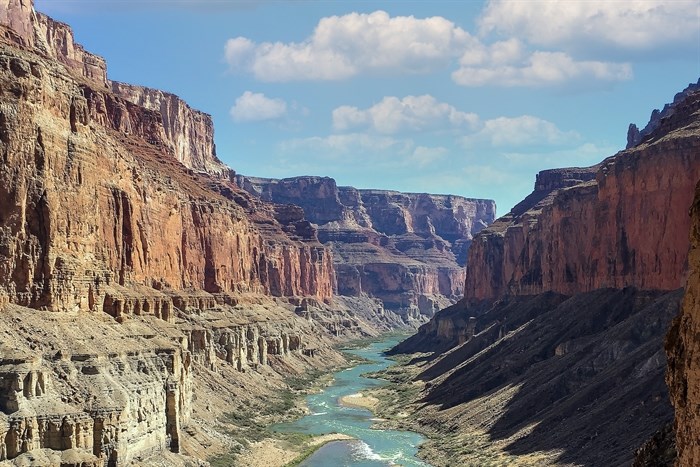
(DON THOMPSON / iNFOnews.ca)
August 22, 2022 - 12:00 PM
OPINION
The flight approach to runway 19 Right for the airport in Las Vegas takes you over Hoover Dam and Lake Mead, man-made oases in an otherwise moonscape setting. In 1981 - my first visit to the City of Lost Wages - my view wasn’t from a porthole seat of a commercial jet, it was through the windshield of a Gulfstream II jet.
As the Chief Speechwriter and Media Relations Advisor for Irving Shapiro, the Du Pont Company Chairman and CEO, flying in a corporate jet - avoiding the inconveniences of commercial airlines - was a perk that I miss even more today.
I’ll never forget that view…the clear blue sky and water…the contrasting orange and red hues of the Mojave Desert at sunset…gorgeous. The view today - 41 years later - is not just different…it is visual evidence of how we are losing the war against climate change.
When full, Lake Mead is America’s largest reservoir…the water supply for more than 25 million residents of Arizona, Nevada and California…about 60 percent of Canada’s population. The disturbing environmental story of the Colorado River, Hoover Dam and Lake Mead isn’t just a U.S. tale.As has been said of other poor political, environmental and cultural decisions in the U.S., “When America sneezes, Canada catches a cold.”
Today, that same flight approach to runway 19 Right reveals an impending tragedy. The surface of Lake Mead is 186 feet lower than my flight 41 years ago…the lake is one-fourth the size it once was.
Lake Mead is giving up its ghosts. This Summer, a crashed U.S. Army Air Corps B-29 - submerged since 1942 - has risen from the deep. Two bodies - one a decades-old mob hit in a rusting oil barrel - have been found…along with countless handguns, designer sunglasses, baby strollers, exploded military ordnance, human jawbones and enough tires to stock a store.
You can even walk through the streets and ruins of St. Thomas, a town of 500 Mormons founded in 1865 and now a ghost town that has been high and dry since 2012.
The water level in Lake Mead started dropping less than two years from my first visit more than four decades ago…and prolonged drought and increased water demand due to a growing population have reduced its depth to the lowest level ever.
Ironically, Las Vegas has done a better job conserving water than almost any large American city. In the past 20 years the population of Las Vegas increased by 750,000 people…but water demand decreased by 26 percent.
The city started taking steps early on…treating all water entering residential and commercial drains and pumping it back into Lake Mead. Also, the city known for rolling out the red carpet for visitors started ripping up its green grass….banning non-functional grass alongside roadways, medians and roundabouts that served no purpose other than looking nice.
Watering just one square-foot of grass in Las Vegas uses 73 gallons of water per year, while drought tolerant landscaping uses just 18 gallons. By banning non-functional grass alone, Las Vegas saves 9.5 billion gallons of water a year…nearly 10 percent of Southern Nevada's total water supply.
But the Las Vegas success notwithstanding…almost every other city, town and village in the three states that use Lake Mead water has failed miserably at conservation. That’s why a U.S. Congressional hearing in June gathered testimony for the Department of the Interior’s Bureau of Reclamation - which governs water usage - on what all water users will have to do not sometime in the future but next year.
Last year, California, Nevada and Arizona used seven million acre-feet of water from the Colorado. That’s enough to cover seven million theoretically flat acres of land in one foot of water. Next year, there will be at least 15 percent less available…more than one million acre-feet of water.

The Colorado River passes through Hoover Dam, generating electricity and forming Lake Mead - America’s largest reservoir - that is drying up and creating a water emergency for all.
Image Credit: PEXELS
But there are four more states - Colorado, New Mexico, Utah and Wyoming - that use water that flows from the Rocky Mountains into the Colorado River before reaching Lake Mead. These states comprise the Upper Basin, with some 15 million more people relying on this water source…added to the Lower Basin states of Nevada, Arizona and California…which, again, serves 25 million folks.
People in all seven states are already screaming, “We need our water!” and so the new cuts are just more bad news. But climate change is pushing decisions that would have been much easier and could have been made decades ago. Depending on the weather in the next year…the cuts in water availability could grow even more severe.
This year alone the giant turbines in Hoover Dam are 13 percent less efficient than last year…simply do to the rapidly reducing volume of water - and thus pressure - in the Colorado River and Lake Mead to spin the turbines.
About 70 percent of the Colorado River water goes toward irrigation, sustaining a $50 billion-a-year agricultural industry that supplies 90 percent of the United States’ winter vegetables…with $22 million in exports…primarily to Canada. California produces 84 percent of broccoli and cauliflower, 76 percent of strawberries, 90 percent of almonds, and almost 70 percent of lettuce and carrots consumed in Canada.
So, regardless of the decisions and steps taken by the seven states…there is an impact on Canada…in higher prices and potential shortages. I wish I had greater faith in the political will of Americans to do the right things in time to avert emergencies, but I don’t.
In my mind’s eye I can still see that massive Lake Mead of 41 years ago. But, I know flying into Las Vegas today…lining up an approach on runway 19 Right…my view might be clouded with tears.
— Don Thompson, an American awaiting Canadian citizenship, lives in Vernon and in Florida. In a career that spans more than 40 years, Don has been a working journalist, a speechwriter and the CEO of an advertising and public relations firm. A passionate and compassionate man, he loves the written word as much as fine dinners with great wines.
We welcome your comments and opinions on our stories but play nice. We won't censor or delete comments unless they contain off-topic statements or links, unnecessary vulgarity, false facts, spam or obviously fake profiles. If you have any concerns about what you see in comments, email the editor.
News from © iNFOnews, 2022